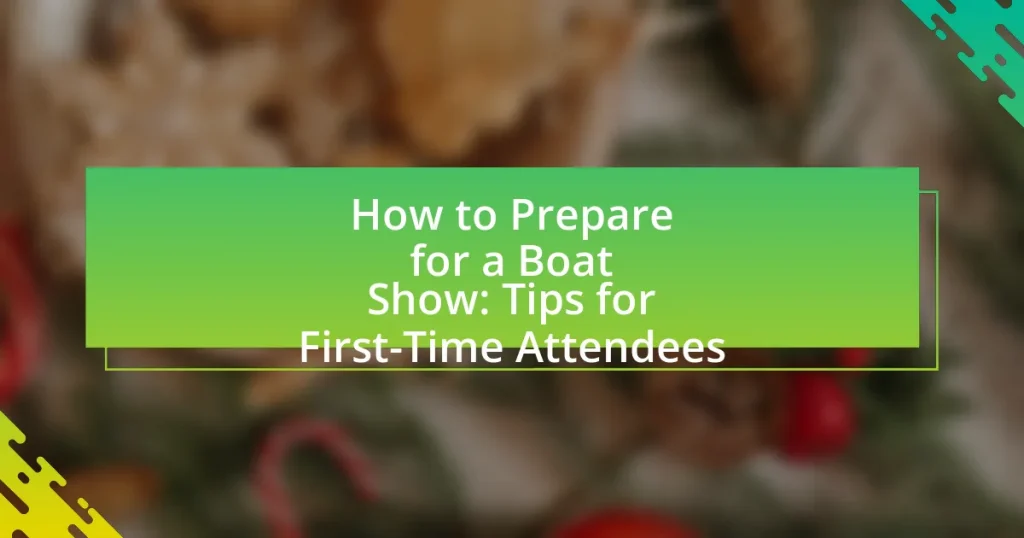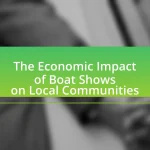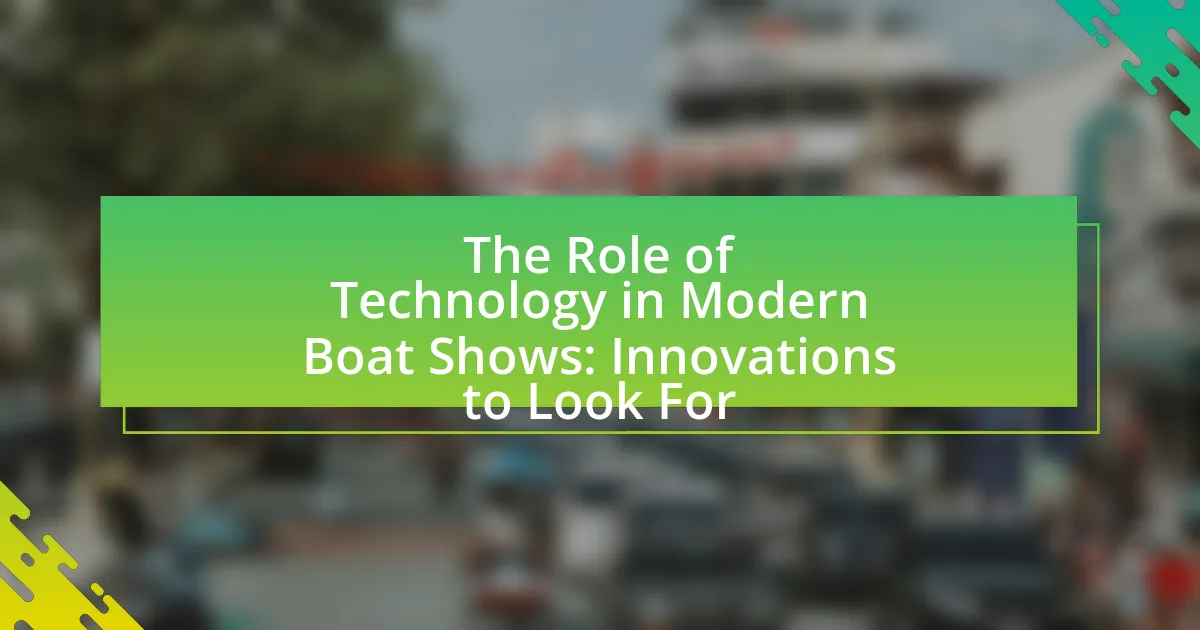The article focuses on essential preparation tips for first-time attendees of a boat show, emphasizing the importance of research, planning, and understanding the event layout. Key topics include the benefits of attending, such as access to a variety of boats and networking opportunities, as well as strategies for effective time management and budgeting. Additionally, the article outlines common mistakes to avoid and practical tips for maximizing the overall experience, including creating a personalized agenda and following up with contacts after the event. Overall, it serves as a comprehensive guide to ensure a productive and enjoyable visit to a boat show.
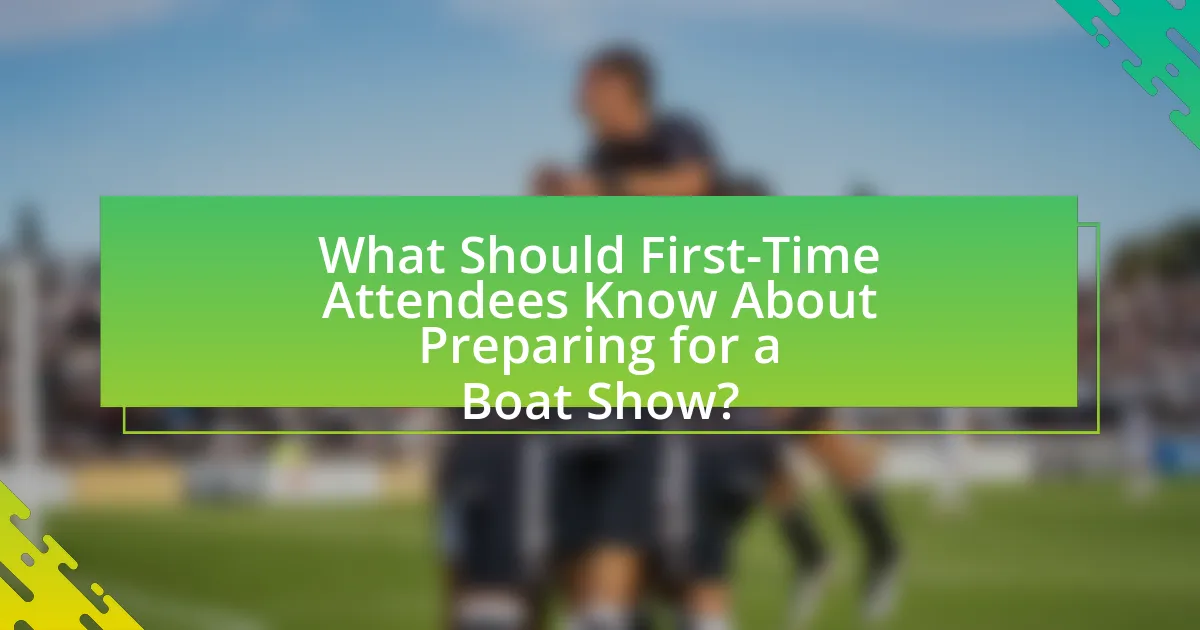
What Should First-Time Attendees Know About Preparing for a Boat Show?
First-time attendees should know that preparing for a boat show involves researching the event, planning their visit, and understanding the layout. Researching the boat show includes checking the schedule, identifying exhibitors, and noting any special events or seminars that may be of interest. Planning the visit entails deciding on the best days to attend, considering transportation options, and budgeting for potential purchases. Understanding the layout helps attendees navigate the venue efficiently, ensuring they can visit all desired exhibits. These steps enhance the overall experience and maximize the value of attending the boat show.
How can attendees benefit from attending a boat show?
Attendees can benefit from attending a boat show by gaining access to a wide variety of boats and marine products, allowing them to compare features, prices, and technologies in one location. This exposure helps attendees make informed purchasing decisions, as they can interact directly with manufacturers and dealers, ask questions, and receive expert advice. Additionally, boat shows often feature educational seminars and workshops that provide valuable information on boating safety, maintenance, and navigation, enhancing attendees’ knowledge and skills. According to the National Marine Manufacturers Association, boat shows attract thousands of visitors, making them a prime opportunity for networking with industry professionals and fellow boating enthusiasts.
What opportunities do boat shows provide for networking?
Boat shows provide numerous networking opportunities by bringing together industry professionals, potential buyers, and enthusiasts in a focused environment. Attendees can connect with manufacturers, dealers, and service providers, facilitating relationships that can lead to collaborations, partnerships, and sales. Additionally, seminars and workshops at these events often feature industry leaders, offering attendees the chance to engage directly with experts and expand their professional networks. The concentrated nature of boat shows, with thousands of participants, enhances the likelihood of meaningful interactions, making them a valuable platform for networking within the boating community.
How can attendees learn about the latest boating trends at a boat show?
Attendees can learn about the latest boating trends at a boat show by participating in seminars and workshops that focus on current industry developments. These educational sessions often feature experts discussing innovations in boat design, technology, and sustainability practices. Additionally, attendees can explore exhibitor booths showcasing new products and services, which provide firsthand insights into emerging trends. According to the National Marine Manufacturers Association, boat shows are key venues for unveiling new models and technologies, making them essential for staying updated in the boating industry.
What are the essential steps to prepare for a boat show?
To prepare for a boat show, attendees should follow these essential steps: research the event details, create a plan for the visit, and gather necessary materials. Researching the event includes checking the schedule, location, and exhibitors to maximize the experience. Creating a plan involves deciding which boats and vendors to visit, as well as setting specific goals for the visit, such as networking or gathering information on specific models. Gathering necessary materials includes bringing a notepad for notes, a camera for photos, and any promotional materials or business cards if representing a company. These steps ensure a productive and organized experience at the boat show.
How should attendees research the boat show before attending?
Attendees should research the boat show by reviewing the event’s official website for schedules, exhibitors, and featured boats. This website typically provides essential information such as dates, locations, ticket prices, and any special events or seminars. Additionally, attendees can explore social media platforms and online forums to gather insights from previous attendees about their experiences and recommendations. Researching industry publications and blogs can also offer valuable information on the latest trends and innovations showcased at the event. This approach ensures attendees are well-informed and can maximize their experience at the boat show.
What items should attendees bring to the boat show?
Attendees should bring a notepad and pen to the boat show for taking notes on various boats and products. This allows them to record important information, such as specifications, pricing, and features of interest. Additionally, attendees should carry a camera or smartphone for capturing images of boats and displays, which can aid in later decision-making. Comfortable footwear is essential, as attendees will likely be walking and standing for extended periods. A reusable water bottle is also advisable to stay hydrated throughout the event. Lastly, attendees should consider bringing a tote bag for collecting brochures and promotional materials from exhibitors.
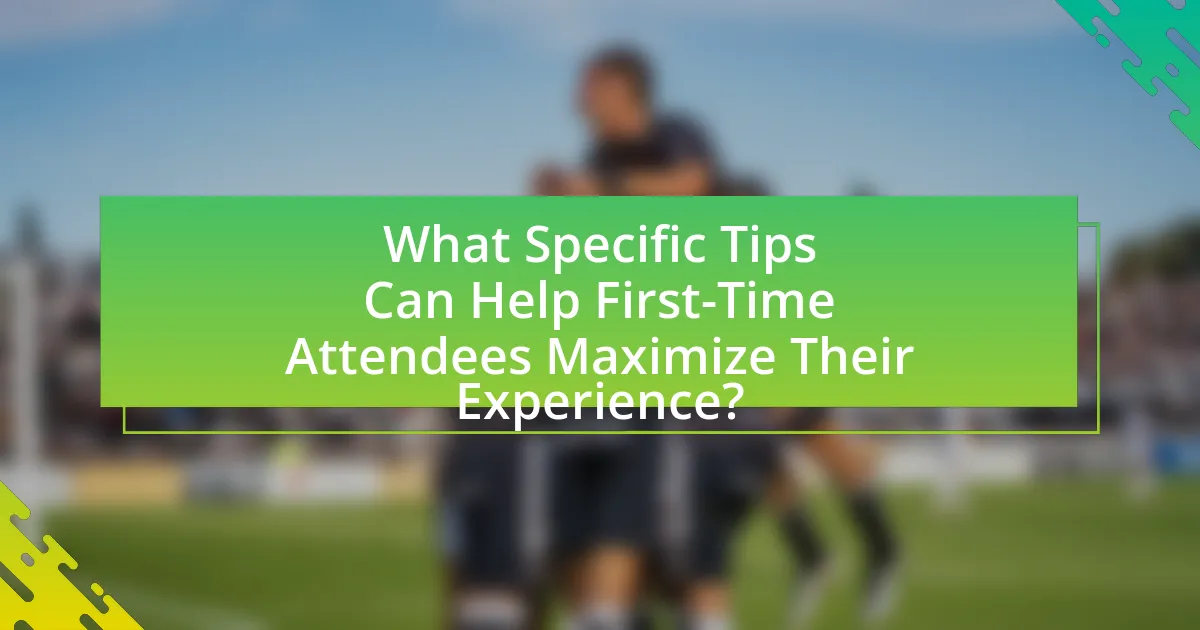
What Specific Tips Can Help First-Time Attendees Maximize Their Experience?
First-time attendees can maximize their experience at a boat show by planning their visit in advance. This includes researching the exhibitors and the layout of the venue to prioritize which boats and products to see. Additionally, attendees should prepare a list of questions to ask vendors, ensuring they gather valuable information about the boats and accessories that interest them. Engaging in seminars or workshops offered at the show can also enhance their knowledge and experience. According to the National Marine Manufacturers Association, boat shows provide a unique opportunity to compare products and learn from industry experts, making preparation essential for a rewarding visit.
How can attendees create a personalized agenda for the boat show?
Attendees can create a personalized agenda for the boat show by utilizing the event’s official website or mobile app to select specific exhibitors, seminars, and activities that align with their interests. This approach allows attendees to filter options based on categories such as boat types, accessories, and educational sessions, ensuring they prioritize what matters most to them. Additionally, attendees should consider time slots for each selected activity to avoid scheduling conflicts, thereby maximizing their experience at the show.
What key areas should attendees prioritize during their visit?
Attendees should prioritize the exhibit halls, educational seminars, and networking opportunities during their visit to a boat show. The exhibit halls showcase the latest boats and marine products, allowing attendees to compare features and prices directly. Educational seminars provide valuable insights from industry experts on topics such as boat maintenance, safety regulations, and new technologies. Networking opportunities enable attendees to connect with other boating enthusiasts, industry professionals, and potential buyers, fostering relationships that can enhance their boating experience. Prioritizing these areas ensures attendees gain comprehensive knowledge and valuable connections within the boating community.
How can attendees effectively manage their time at the show?
Attendees can effectively manage their time at the show by creating a detailed schedule that prioritizes key events, exhibitors, and activities of interest. This approach allows attendees to allocate specific time slots for visiting booths, attending seminars, and networking, ensuring they maximize their experience. Research indicates that individuals who plan their day in advance are 30% more likely to engage with their top choices and avoid missing important opportunities. Additionally, utilizing event apps or maps can help attendees navigate the venue efficiently, further enhancing time management.
What strategies can enhance networking opportunities at the boat show?
To enhance networking opportunities at the boat show, attendees should actively engage in scheduled events, such as seminars and workshops, which facilitate interaction with industry professionals. Participating in these events allows individuals to meet key players in the boating industry, share insights, and establish connections. Additionally, utilizing social media platforms, like LinkedIn, to connect with other attendees before and after the event can further strengthen these relationships. Research indicates that 85% of professionals consider networking essential for career advancement, highlighting the importance of strategic engagement at such events.
How can attendees approach exhibitors and industry professionals?
Attendees can approach exhibitors and industry professionals by preparing thoughtful questions and engaging in meaningful conversations. This proactive approach demonstrates genuine interest and facilitates networking opportunities. Research indicates that attendees who come equipped with specific inquiries about products or services are more likely to receive informative responses, enhancing their overall experience at events like boat shows.
What follow-up actions should attendees take after meeting contacts?
Attendees should send personalized follow-up emails to contacts they met at the boat show within 24 to 48 hours. This prompt communication reinforces the connection made during the event and demonstrates professionalism. Including specific details from the conversation, such as shared interests or topics discussed, enhances the personalization of the message. Additionally, attendees should connect on professional networking platforms like LinkedIn to maintain the relationship and facilitate future interactions. Following up with any promised information or resources discussed during the meeting further solidifies the connection and shows reliability.
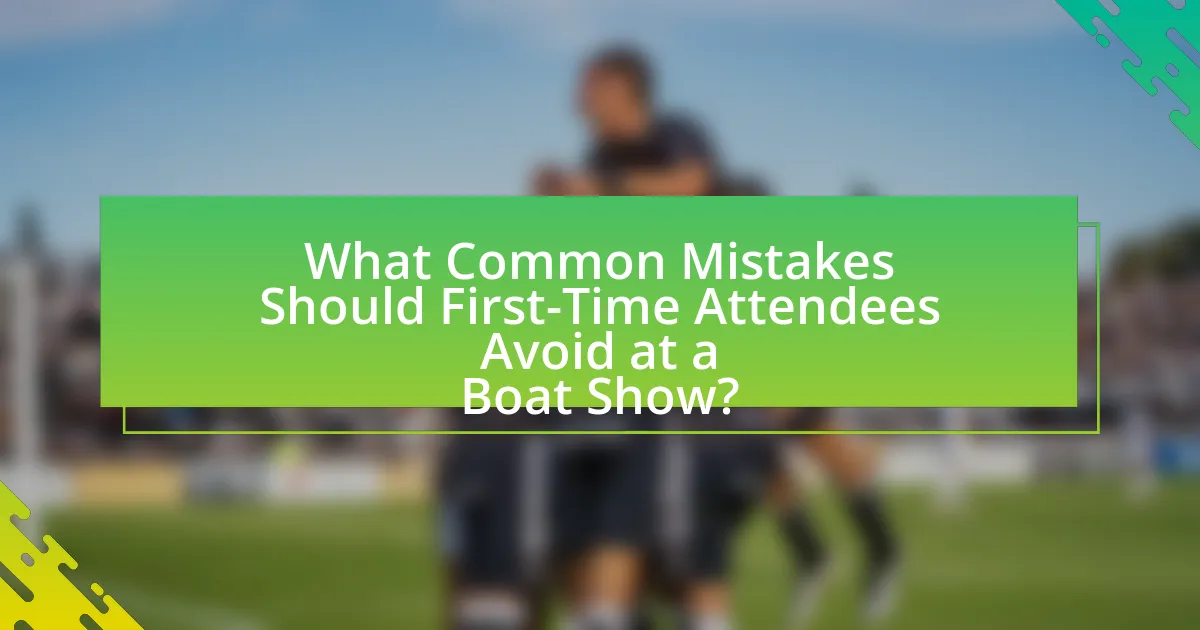
What Common Mistakes Should First-Time Attendees Avoid at a Boat Show?
First-time attendees at a boat show should avoid not doing adequate research on the exhibitors and boats beforehand. This mistake can lead to missed opportunities to engage with specific brands or models of interest. Additionally, attendees often overlook the importance of setting a budget, which can result in impulsive purchases or financial strain. Another common error is failing to wear comfortable clothing and shoes, as boat shows typically involve extensive walking and standing. Lastly, first-time visitors frequently underestimate the value of networking; not bringing business cards or contact information can hinder future connections in the boating community.
What are the pitfalls of not planning ahead for the boat show?
Not planning ahead for the boat show can lead to missed opportunities and increased stress. Attendees may find themselves unable to secure accommodations, as hotels often fill up quickly during major events, resulting in higher costs or inconvenient locations. Additionally, without a clear agenda, individuals risk overlooking key exhibitors or seminars that align with their interests, diminishing the overall experience. Furthermore, inadequate preparation can lead to logistical issues, such as transportation challenges or insufficient time to explore the show, ultimately reducing the effectiveness of their visit.
How can attendees avoid feeling overwhelmed by the number of exhibits?
Attendees can avoid feeling overwhelmed by the number of exhibits by planning their visit in advance. Creating a prioritized list of must-see exhibits based on personal interests helps streamline the experience. Researching the exhibitors beforehand, including their offerings and locations, allows attendees to navigate the show more efficiently. Additionally, setting specific time limits for each exhibit can prevent aimless wandering and reduce anxiety. Studies show that pre-event preparation significantly enhances attendee satisfaction and reduces feelings of being overwhelmed in large settings.
What should attendees know about budgeting for the boat show?
Attendees should know that budgeting for the boat show involves accounting for ticket prices, travel expenses, accommodation, and additional costs such as food and merchandise. Ticket prices can vary significantly, often ranging from $10 to $50, depending on the show and day of attendance. Travel expenses should include fuel or airfare, while accommodation costs will depend on proximity to the venue and duration of stay. Additionally, attendees should allocate funds for meals and potential purchases, as many boat shows feature exclusive merchandise and deals. Planning a budget that encompasses these elements ensures a comprehensive financial approach to attending the event.
What practical tips can ensure a successful boat show experience?
To ensure a successful boat show experience, attendees should plan their visit by researching exhibitors and creating a prioritized list of boats and products to see. This preparation allows attendees to maximize their time and focus on their specific interests. Additionally, arriving early can help avoid crowds and provide better access to popular exhibits. Engaging with exhibitors by asking questions and taking notes enhances understanding and retention of information. Finally, wearing comfortable shoes and clothing is essential, as boat shows often require extensive walking and standing. These practical tips contribute to a more organized and enjoyable experience at the event.
How can attendees stay organized during the event?
Attendees can stay organized during the event by creating a detailed schedule that includes session times, locations, and key exhibitors to visit. This approach allows attendees to allocate their time effectively and ensures they do not miss important presentations or networking opportunities. Additionally, utilizing event apps or printed materials that provide maps and agendas can help attendees navigate the venue efficiently, enhancing their overall experience. Studies show that individuals who plan their activities in advance are more likely to achieve their goals during events, making organization a critical factor for success.
What are the best practices for following up after the boat show?
The best practices for following up after the boat show include sending personalized thank-you emails to contacts made during the event, reviewing notes taken at the show to identify key discussions, and scheduling follow-up meetings to deepen relationships. Personalizing communication reinforces connections and shows appreciation, while reviewing notes ensures that important details are not overlooked. Scheduling meetings allows for further engagement and exploration of potential collaborations or sales opportunities. These practices enhance networking effectiveness and can lead to fruitful business relationships.
